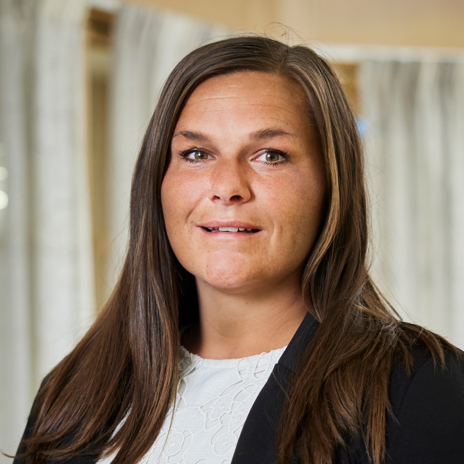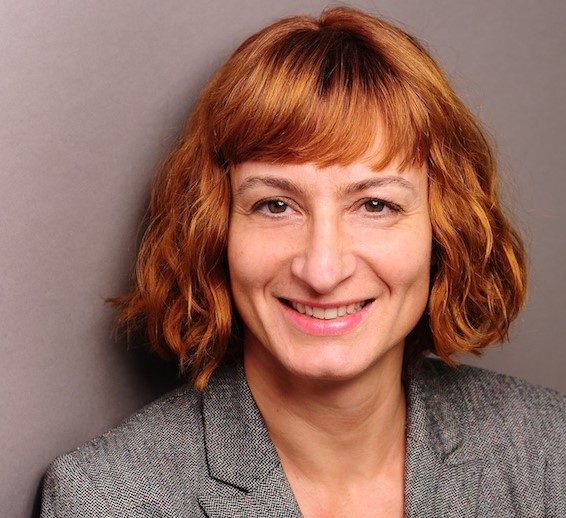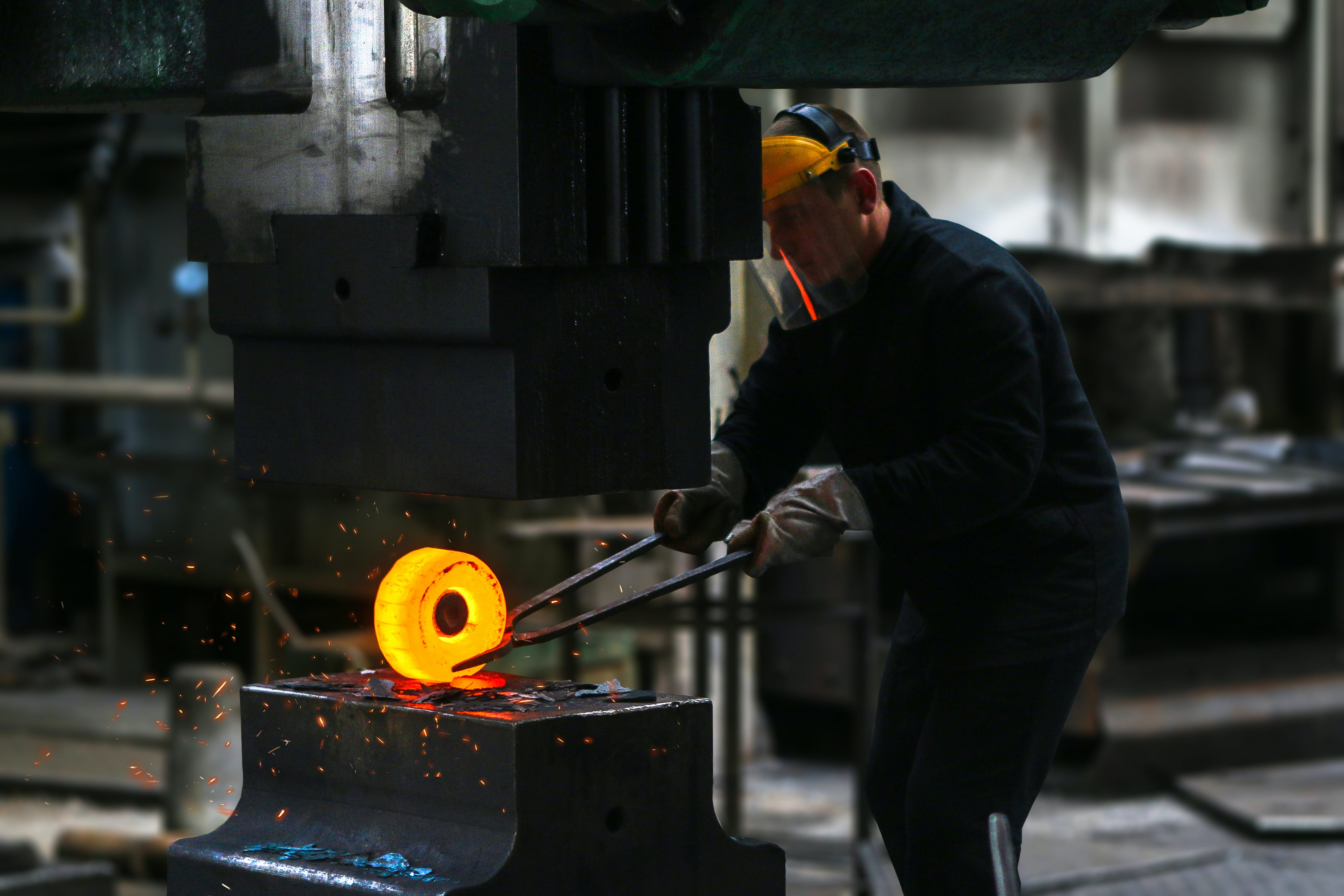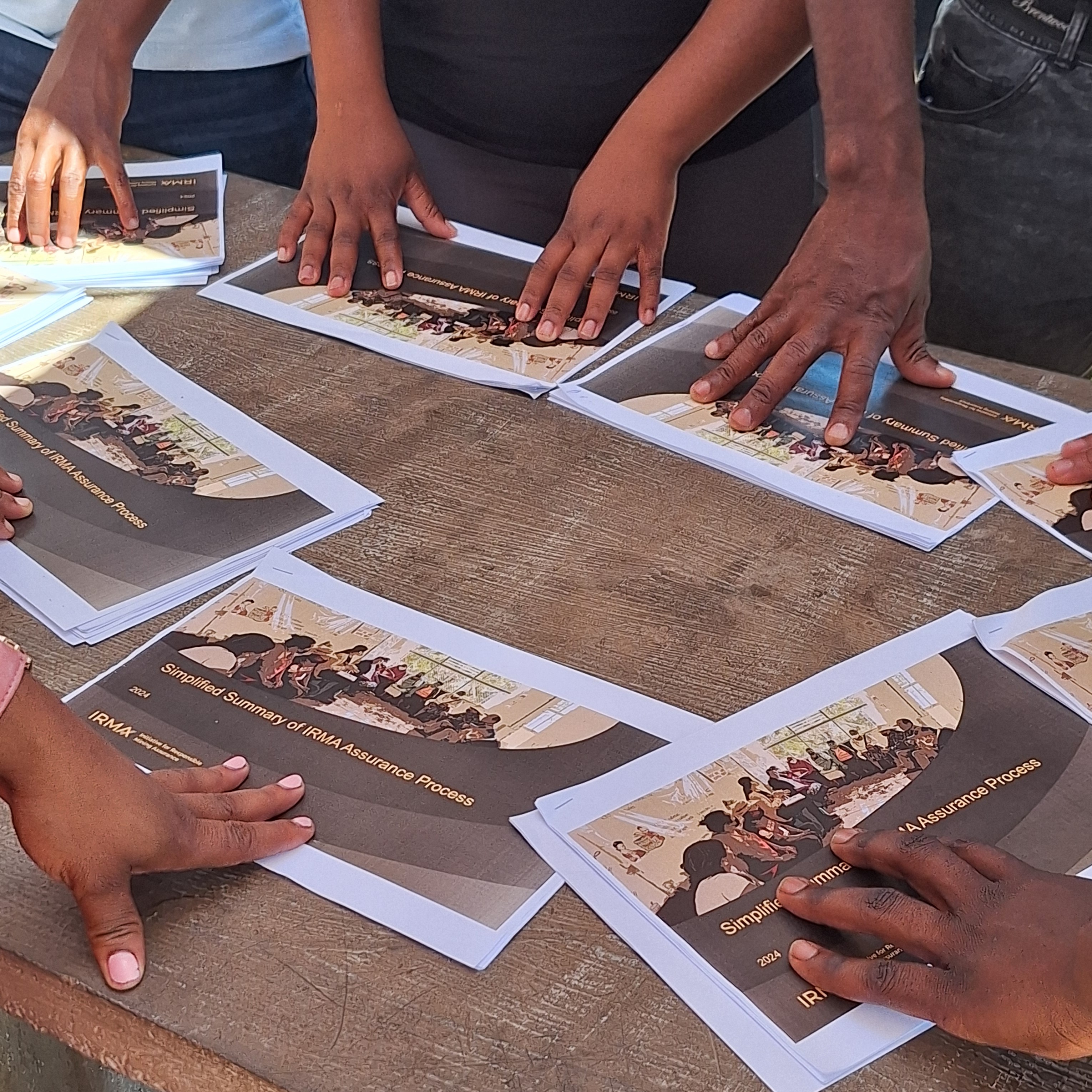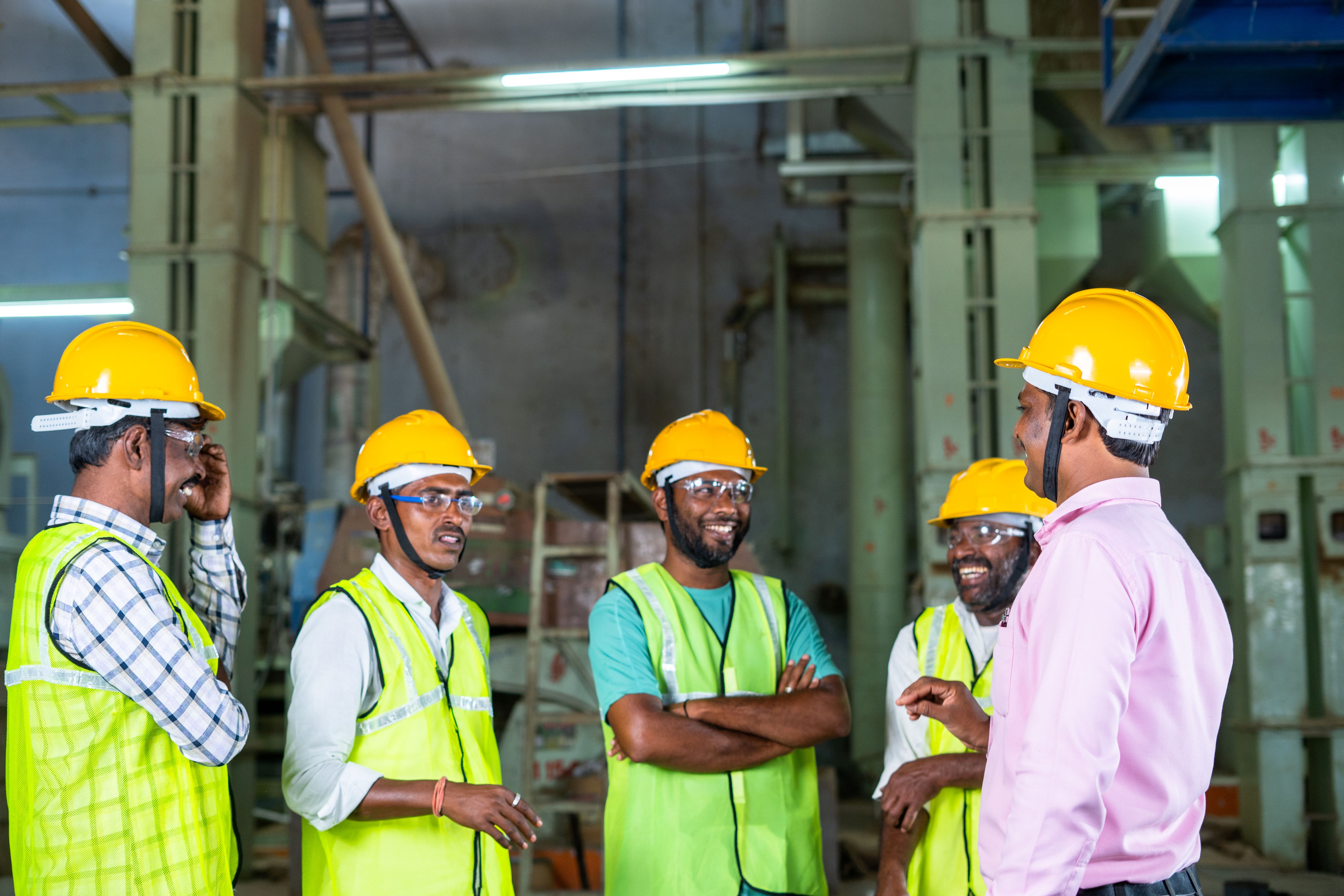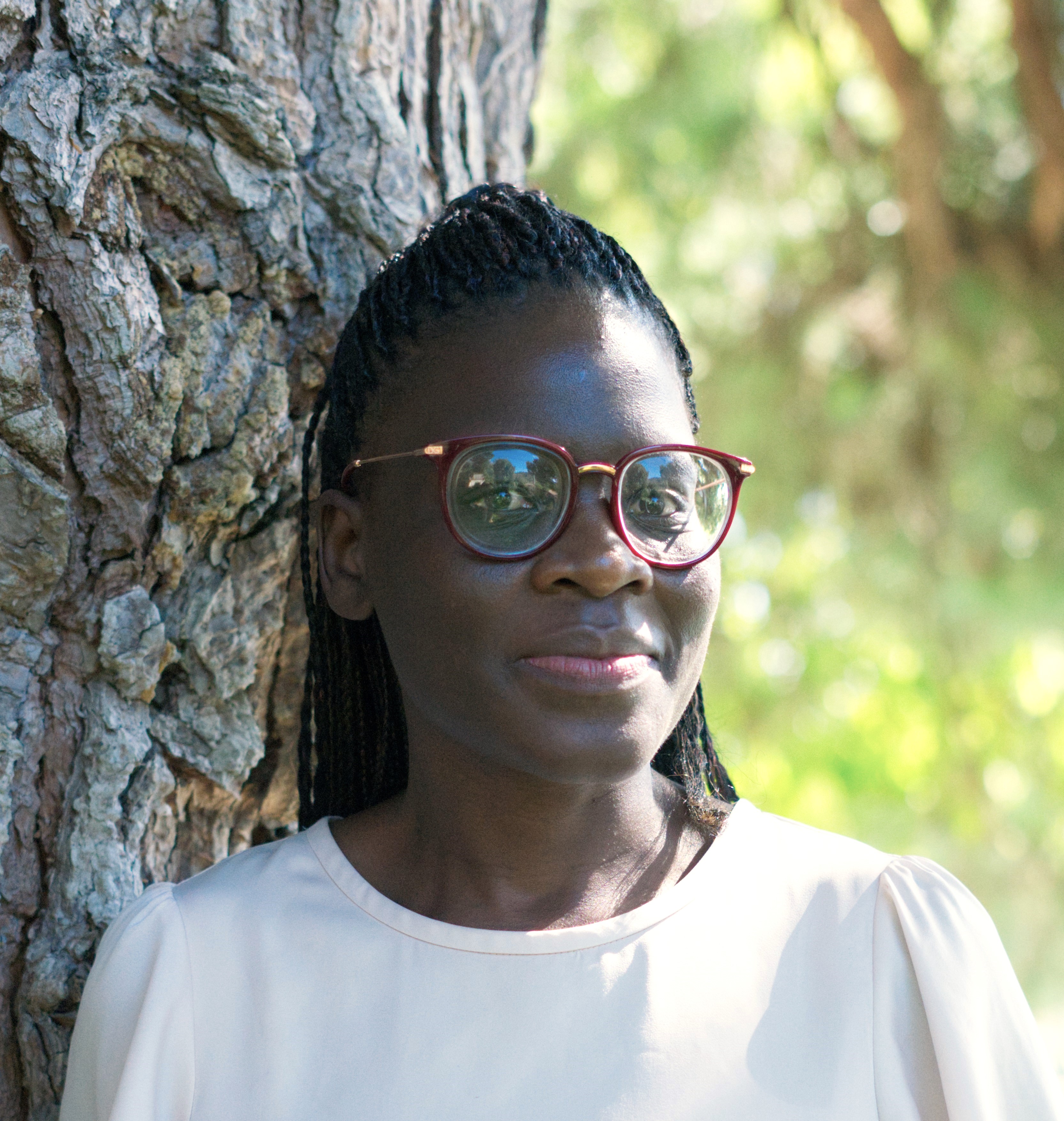

ResponsibleSteel and global banks agree MoU for the rapid decarbonization of steel
As world leaders prepare to gather in Davos next week for the World Economic Forum, ResponsibleSteel is delighted to announce it has agreed an MoU with the Sustainable STEEL Principles Association (“SSPA”). This is a huge and positive step toward harmonization and greater collaboration between the two organisations and paves the way for the facilitation of the faster decarbonisation of steel.
Annie Heaton, CEO of ResponsibleSteel said, “With the clock ticking on climate change, we need pragmatic solutions to tackle climate change especially, in relation to heavy industry. These solutions need to be based on technological breakthroughs, innovation and creative problem solving. They also need to be global. None of this will be possible without a radical step change in how we finance these breakthroughs so industries like steel can decarbonize rapidly and be a force for good. The MoU between the SSPA and ResponsibleSteel signifies a continued determination by banks, the steel industry and wider stakeholders to achieve real progress towards net zero by 2050, and all the complexities which that entails.”
Steel decarbonization has come under the spotlight recently at global leaders’ meetings, for example COP26 and COP 27, which is right given the significant contribution of the industry to global greenhouse gas emissions. Amidst the proliferation of initiatives now focusing on steel decarbonization, this MoU signals a clear recognition that more work must be done to avoid a divergence of standards and work towards alignment, where possible.
Both the SSPA and ResponsibleSteel have pragmatic and expert pathways towards rapid sustainability. The SSP provide a framework for banks to assess the decarbonization of the steel companies within their portfolios, as well as the climate alignment of their steel lending portfolio. ResponsibleSteel provides an international standard for steel sites to be certified against.
Erik van Doezum, Global Steel Lead at ING and Chair of the SSP said, “The decarbonization of the steel sector globally requires significant investments to be made, and financing will be needed to facilitate these. Banks therefore will have to identify high quality decarbonization business plans, allowing them to guide their assets into investments compatible with a 1.5C future. Building consistent and transparent data via reporting requirements for the steel sector will be paramount to facilitating financing for the decarbonization of the sector. This will enable all parties – steelmakers, lenders and other stakeholders – to use and understand common measures of progress. That is why we believe that this MoU between Responsible Steel and the SSPA is important – it signifies the importance of collaboration towards those ends.”
Much analysis and scrutiny has gone into understanding the dynamics of the steel sector in the development of both the new ResponsibleSteel GHG requirements and those of the Sustainable STEEL Principles. The SSPA and ResponsibleSteel have now signaled a continuing desire to cooperate in the interest of complementarity between standards.
In addition to this MoU announced today, ResponsibleSteel is setting up a Finance Working Group (FWG) with key voices from the steel industry, global finance, investment and civil society. Its goal will be to facilitate dialogue including benchmarking carbon requirements within the ResponsibleSteel Standard and certification programme in order to facilitate capital flows to meet decarbonization requirements. The initial round of discussion will start this month and the FWG hopes to report on its recommendations by December 2023.


ArcelorMittal Monlevade becomes certified against the ResponsibleSteel Standard
The ArcelorMittal site, located in João Monlevade in the state of Minas Gerais, has recently been certified against the ResponsibleSteel Standard following a year-long process involving a rigorous audit conducted by DNV (Det Norske Veritas).
Founded in 1937, the Monlevade plant produces long carbon steels with special characteristics for the manufacture of auto parts such as steel cords for tyres, bars for shock absorbers, helical springs, fasteners, steel wool, cables, and welds. Its steel is present in three out of four tires used in Brazil.
ResponsibleSteel CEO Annie Heaton commented, “this is an exciting accomplishment which has been a long time in the works. It’s a reflection of the dedication and hard work ArcelorMittal Monlevade has put in to ensure they are meeting the highest standards of responsible steel production. In addition to achieving carbon neutrality by 2050, they have set an interim commitment of reducing scope 1 and 2 emissions by 10% by 2030. They have also taken great care to meet the needs of workers and the local community and to implement practices which protect the surrounding natural environment.”
DNV Brasil’s auditors visited all the facilities of the Monlevade site and interviewed stakeholders and the site’s leadership to assess the operations and processes according to the principles of the ResponsibleSteel Standard. They interacted with employees, contractors, representatives of the City Council and social projects, and community leaders, among others.
“The ResponsibleSteel certification is one of the most complex to be achieved. It assesses governance standards, from decarbonization of processes to respect for human rights, local communities and employees, from the safety of employees and processes to the responsible use of natural resources,” explained Fabiano Cristeli, head of operations at ArcelorMittal Monlevade.
He continued, “the Biodiversity Master Plan, the high rate of water recirculation, which is 98.77%, as well as the suppliers’ training on conduct and anti-corruption policies outstood. Other actions were well rated in the report, including the fight against child labour, the preparation of teams of volunteers, and the support for social projects in the region, such as the Chords project, which consists of teaching classical music to children and youngsters.” The company’s goals of having 25% of women in leadership positions by 2030 and of being carbon neutral by 2050 also drew the auditors’ attention.
The Monlevade site will also be receiving investments of BRL 2.5 billion by 2024 to facilitate its expansion. The expansion is expected to increase production capacity from 1.2 million tons to 2.2 million tons of steel per year and create 650 jobs onsite, plus generate further jobs during the expansion process. The investment will enable the implementation of another sinter plant and a new blast furnace, in addition to other improvements. Following the expansion, the Monlevade plant will be one of the largest long carbon producers in the country.
The audit report was reviewed by an independent Assurance Panel and the certificate is valid for three years. It is the second one obtained by an ArcelorMittal operation in Brazil following the certification of the Tubarão site in March 2022. ArcelorMittal’s goal is to certify all plants in Brazil by December 2023.
Read the full press release here or watch the video announcement by ArcelorMittal South America Long CEO Jefferson de Paula here.


December 2022 Letter
Please view the December 2022 letter from our CEO, Annie Heaton, by clicking the link below:


Forum III Highlights
2022 has been a year of great progress for ResponsibleSteel and the steel industry more broadly. We have made huge strides in the last twelve months. And after three years, we were finally able to come together in person at Forum III in Memphis.
We had nearly 200 delegates from over 70 organisations around the world with speakers from leading steel companies, downstream consumers, financial institutions, and civil society. We were thrilled by the enthusiasm demonstrated and we are very grateful to everyone who participated.
We’ve put together a short video celebrating Forum III and sharing a few highlights from participants. Enjoy!
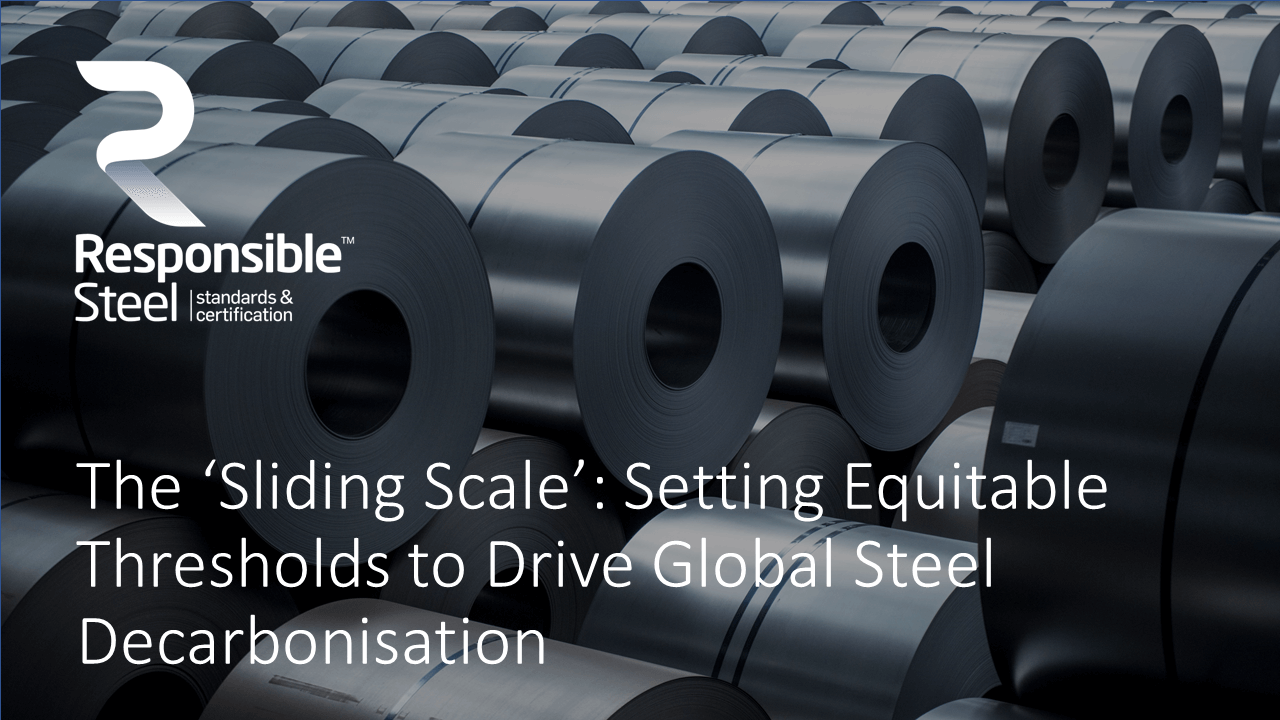

The ‘Sliding Scale’: Setting Equitable Thresholds to Drive Global Steel Decarbonisation
This September the ResponsibleSteel International Standard Version 2.0 was launched following almost three years of development by ResponsibleSteel and its multi-stakeholder membership. It included exacting new criteria on both the responsible sourcing of input materials and on climate change and greenhouse gas (GHG) emissions. Recent years have seen numerous approaches suggested for how best to define the GHG emissions of steel production. This briefing paper situates the use of a ‘sliding scale’ to evaluate a steel production site’s progress on GHG emissions as a key measure to decarbonize the global steel industry. The ‘sliding scale’ is one component of the ResponsibleSteel International Standard.
Steel is one of the world’s most widely used materials. From buildings to bridges, from cargo ships to cutlery, electric vehicles to wind turbines – steel is at the foundation of contemporary societies and in the infrastructure needed to transition to more sustainable ones. Steel has pertinent impacts on both people and planet across environmental, social, and governance issues.
One such issue that is increasingly in the global spotlight is the steel sector’s contribution to climate change. Steel production is estimated to directly emit between 7% and 9% of global anthropogenic carbon dioxide emissions. Diverse actors and stakeholders are taking action to catalyze change and reduce the GHG emissions of the steel sector – civil society, governments, multilateral bodies, steelmakers, steel buyers, financiers, think tanks, academics, and many more.
While the proliferation of actors engaging in this issue is welcome and essential to achieving optimal outcomes, the challenge of steel decarbonisation is best served by the non-proliferation of standards. Common, consistent, and globally comparable definitions are needed.
Decarbonising steel and the ‘sliding scale’
Reducing the steel sector’s global greenhouse gas emissions to net zero will need the world to use less steel, use steel more efficiently, switch to alternative less emissions-intensive materials where possible, maximise the reuse and recycling of steel and, critically, decarbonize steel production itself.
Steel is made with iron-bearing input material through the reduction of iron ore and the recycling of scrap metal. Steelmaking sites use differing shares of these two input materials and consequently different sources of energy input. Iron ore based production – which makes up around 70% of today’s steelmaking – is far more emissions intensive than scrap based production, since stripping oxygen from iron ore is extremely energy intensive and today relies on fossil fuels. Innovative production methods, including those that use cleaner fuels such as hydrogen, are poised to reduce this emissions intensity, but the scale and cost of the transition has historically been prohibitive. In scrap based production, electricity is used and emissions are lower, meaning emissions can be reduced through the procurement of renewable electricity.
Significant demand side measures will be needed to reduce the consumption and therefore production of steel, but 1.5C scenarios still demonstrate the need for significant decarbonisation of steel production. For instance, the International Energy Agency’s (IEA) Sustainable Development Scenario, which outlines a trajectory compatible with the goals of the Paris Agreement, is based on the assumption that two-fifths of the emissions reductions from steel until 2050 occur from material efficiency.
Estimates suggest that about 85% of globally available scrap steel is recycled today. This number must be increased to as close to 100% as possible and the quality of steel reuse and recycling vastly improved, but it also reflects the fact that there is limited and constrained room for growth of scrap steel, at least in the short term. It is well established that there is simply not enough scrap steel to meet demand today nor is there likely to be in 2050. For example, the IEA’s Sustainable Development Scenario, despite its assumption of significant material efficiency, projects total demand increasing from today to around 2 billion tonnes annually in 2050. In this scenario, scrap makes up 46% of iron bearing material, leaving the remainder to be met through iron ore. Additionally, some grades of steel currently require iron ore based production methods. This is not to say that both quantity and quality of scrap steel recovery, processing and use should not be systematically addressed and ameliorated. Rather, that new iron ore based steel will be needed to meet socio-economic needs and to transition to a low carbon future.
The scarcity of scrap combined with its lower emissions profile and the ability of steel plants to incrementally increase scrap input together mean that emissions intensity alone is an insufficient measure to drive the decarbonisation of the steel industry. Incremental increases in scrap usage can significantly lower the emissions profile of steel production at a given steelmaking site, but it is important to be mindful of only serving to shift around the finite supply of scrap from one producer to another.
For the steel customer aiming to contribute to decarbonizing the industry, how can they help to drive industry wide decarbonization? Of course the first principles of design and material efficiency are central, as is driving and enacting genuine high-quality circularity within their operations and supply chain. Selecting steel products according to their emissions intensity alone would drive demand towards steel with higher scrap shares. This could simply cause the finite volumes of scrap to be reallocated, without decarbonizing the industry as a whole.
Setting variable thresholds for embodied GHG emissions that take account of the share of scrap input resolves this issue, and provides effective benchmarks for steelmakers whatever level of scrap they use, and so drives the structural, physical decarbonisation of the steel industry. The ResponsibleSteel Standard V2.0 defines quantitative performance levels for the GHG emissions intensity of crude steel production. It gives four levels ranging from the basic threshold to the near zero threshold. Approaches taking account of the variable amounts of scrap used in production have been dubbed the ‘sliding scale’.
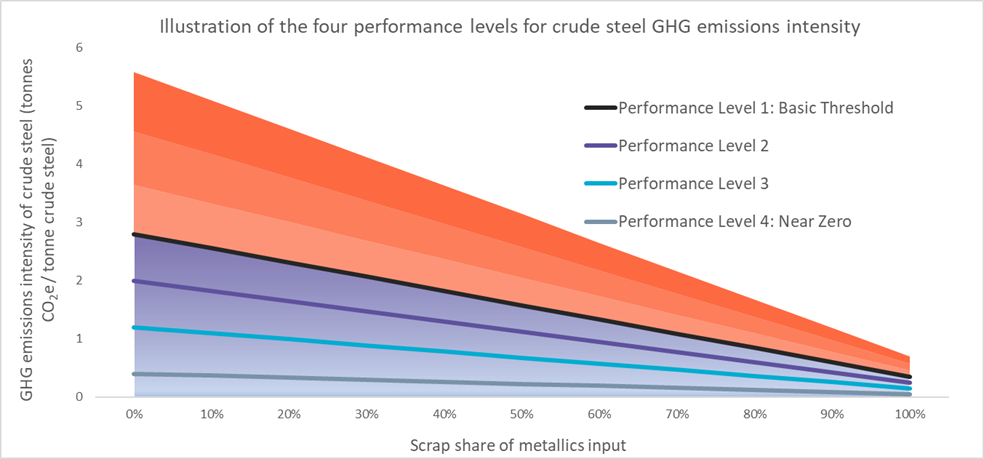
Illustration based on ResponsibleSteel International Standard Version 2.0
Underpinning the ResponsibleSteel scrap-variable GHG thresholds are the accounting rules within its International Standard V2.0 which ensure the consistent and transparent measuring of GHG emissions at the site level. These rules, together with the thresholds, provide a tool for decision makers that reflect a number of principles ResponsibleSteel believes are essential to the establishment of an international standard to drive global steel decarbonization:
Comparable. Specifying the emissions from mine to crude steel production, the standard uses a boundary common to every steelmaker, to ensure comparability of steel production from one producer to another, anywhere in the world and no matter their level of integration. Consistent accounting rules enable ‘apples for apples’ consideration of the GHG emissions embodied in steel.
Stable but adaptable. The ResponsibleSteel International Standard V2.0 also includes a five-yearly review of the specified thresholds, enabling them to be revised with the objective “to achieve the fastest global transition to a near zero steel sector”. This ensures a level of predictability and stability to the thresholds, whilst also leaving flexibility to tighten the requirements and the level of ambition as our understanding of the 1.5°C challenge evolves. The ‘sliding scale’ itself does not prescribe how much steel should meet what level by when. Rather it provides simple graduated measures of progress towards near zero that can be used as an effective tool by customers and governments to achieve their ambitions. Various scenarios provide indications of what is needed, the Mission Possible Partnership’s Carbon Cost scenario for example, identifies the need for 170 million tonnes of annual near zero iron ore based production to be online by 2030 if the industry is to stay on track for a 1.5°C future.
Technology agnostic. The ‘sliding scale’ approach is technology agnostic – it assesses performance by the progress a site makes on GHG emissions. It rewards sites making decarbonization investments across technology measures and means that, regardless of the availability of scrap metal or production technology route, producers can be incentivised to reduce emissions through ever higher levels of recognition.
Equitable. Furthermore, the sliding scale ensures that the standard is globally comparable and non-discriminatory. Steel is produced – and needed – across the world and yet the availability of scrap is geographically uneven. Countries with longer histories of large scale steel production and so greater existing stocks of steel – in cars, buildings, ships – have greater opportunities to recycle steel and therefore produce steel from scrap. In practice, this means that countries that today have growing steel demand – which historically has been closely linked to social and economic development – face the greatest obstacles to meeting demand with steel from scrap. While scrap is an internationally traded commodity, it is increasingly seen as a strategic resource and can be subject to export restrictions.
For further information on the rationale for a ‘sliding scale’ approach, see the article ‘Achieving Net Zero in the Steel Sector’ in Chatham House’s Sustainability Accelerator, and the IEA’s (2022) recent report to the G7.
A vital piece of the puzzle
Sustainable development focused. The ‘sliding scale’ is not a silver bullet. ResponsibleSteel’s strategic mission is to drive the production of net zero steel globally that is both environmentally and socially responsible. The ResponsibleSteel International Standard Version 2.0 requires steelmaking sites to operate responsibly across 13 principles that incorporate the full spectrum of environmental, social, and governance issues relevant to the steel sector. The Standard was developed by ResponsibleSteel and its multi-stakeholder membership aiming to follow ISEAL Codes of Good Practice. Certification against the Standard is backed by a robust assurance programme. To date, steelmaking sites across five continents representing over 100 million tonnes of production capacity and over 157,000 workers have been site certified.
Complementary. An effective ‘sliding scale’ complements rather than replaces other measures and performance requirements on decarbonisation and greenhouse gas emissions. The ResponsibleSteel International Standard V2.0 takes a multifaceted approach to climate change and greenhouse gas emissions. Alongside variable performance thresholds and among other requirements, it mandates both science-based targets at the corporate level (with strategies and plans at the site level) and, at higher levels of certification, it requires product carbon footprints for steel sold from a site. Net zero targets drive and reward forward planning, and science-based targets ensure the early investments required to deliver GHG emissions reductions within 5-10 years. Data on product carbon footprints can be used by customers to measure emissions in their supply chain and reduce emissions on a company, project and product level, while the ‘sliding scale’ ensures those products are contributing to global climate goals. It can also complement minimum scrap thresholds for products and measures to maximise material efficiency, the reuse, and the recycling of steel.
Scrap-variable thresholds have been included in ResponsibleSteel’s climate change and GHG emissions approach to ensure that the Standard is comparable, enabling apples for apples consideration of steel production globally, stable but adaptive, technology agnostic, equitable, sustainable development focused, and complementary to other measures and performance requirements. These principles, among many others, are vital to setting effective and common definitions. The ‘sliding scale’ enables policy makers, steel buyers, and financiers to match ambition with real, physical decarbonisation of the steel industry – globally. It should be used as a key measure of GHG emissions performance for steelmaking.


November 2022 Newsletter
Please view our November 2022 newsletter by clicking the link below:


Shaping the future of responsible steel
We are at a critical juncture in the steel industry. We have the opportunity to create real, long-lasting change for both people and the planet.
ResponsibleSteel is working to drive the creation of a net zero industry with sustainability at its core. We are a community with members from across the steel value chain and civil society. And we are proud to have around 13% of the global steel industry in membership and certified sites on 5 continents covering the production of over 100 million tonnes of steel.
It’s time to build momentum and work together to shape the future of the industry.


ResponsibleSteel Applauds Site Certification of POSCO and Tata Steel Sites
ResponsibleSteel today applauded the certification of the world’s largest steel sites achieving ResponsibleSteel certification. The sites are Pohang and Gwangyang Steelworks in South Korea operated by POSCO together with the Jamshedpur site in India operated by TATA Steel.
This is a monumental step forward for ResponsibleSteel and the global steel industry on the road to sustainable development and decarbonisation. ResponsibleSteel now has around 13% of the world’s steel industry by volume in its membership, with certified sites on 5 continents covering the production of over 100 million tonnes of steel.
Annie Heaton, CEO of ResponsibleSteel speaking at Forum III: Shaping the future of responsible steel in Memphis said, “This is a historic moment for both ResponsibleSteel and the global steel industry on the road to sustainability. With Asia home to 72% of the world’s steel production, the achievement of site certification by these three substantial steel plants takes ResponsibleSteel into a new phase, one of global roll out.”
The ResponsibleSteel Standard is designed to drive forward positive actions for people, planet and the steel industry. The sheer scale of the POSCO and Tata sites certified today means that the production of 103.5 million tonnes of steel and the working lives of 157.4 thousand people are managed by sites that are now independently audited every 18 months.
Heaton continued, “For the steel companies themselves, this has required enormous vision, investment and above all commitment, creating a community of like-minded people working together to find solutions to some of the most pressing issues of the day – climate change, air pollution, diversity and labour rights to name just a few. There will be further to go, but today the producers of over 100 million tonnes of steel can proudly say they have achieved ResponsibleSteel site certification and are well on their way.”
Hag-dong Kim, CEO of POSCO said, “It is a great honour that both Pohang and Gwangyang Steelworks, the world’s two largest mills, have been certified by ResponsibleSteel. Today, as we prepare for the post-pandemic era, it is more important than ever for the steel industry to fulfil its social responsibility and to practice sustainable manufacturing.
To remain viable and competitive, the steel industry must identify sustainable solutions to diverse ESG challenges, such as by achieving carbon neutrality and building a safe workplace.”
Hag-dong Kim continued, “We appreciate ResponsibleSteel’s vision to ‘maximize the steel sector’s contribution to a sustainable society’ and the mission to ‘enhance the responsible sourcing, production, use, and recycling of steel,’ which are commensurate to POSCO’s management philosophy: Corporate Citizenship.
Together with our core values of ‘coexistence’ and ‘symbiosis,’ the new philosophy has propelled us forward on our path to sustainability. I believe this is just the beginning. To build a sustainable business, we hope other sites besides Pohang and Gwangyang will drive change and innovation to seek certification too.”
T. V. Narendran, CEO & MD, Tata Steel, said, “This is a historic moment for Tata Steel and an important step in our sustainability journey. Globally, the steel industry is at a critical juncture and the larger impact of how we produce and consume steel needs to be addressed urgently. For Tata Steel, this has always been a very important part of our journey from when we first produced steel in Jamshedpur in 1912. We are honoured to receive the ResponsibleSteel Certification for three of our facilities and will work towards achieving this recognition for all our production sites. I thank the ResponsibleSteel team, the auditors, assurance panel and the team at Tata Steel for their efforts in making this possible.”
For more information/press interviews with ResponsibleSteel or its members please contact:
Ali Lucas, Director of Communications
alucas@responsiblesteel.org
+44 7786 546724
Savannah Hayes, Communications Manager
shayes@responsiblesteel.org
+44 7588 785909
Denise Meredith, Communications and Media Consultant
denisemeredith1857@gmail.com
+44 7930 531128


September 2022 Newsletter
Please view our September 2022 newsletter by clicking the link below:


A Race Against Time: Key Takeaways from NYC Climate Week 2022
Last week, ResponsibleSteel’s CEO, Annie Heaton, and Policy and Impacts Director, Shivakumar Kuppuswamy, were on the ground in New York for Climate Week. Participating in discussions with industry, policy, and sustainability leaders, it was heartening to see an interconnected ecosystem emerging on steel decarbonization. And everyone was talking about the need for a single, verifiable standard.
Climate Week evidenced the growing private sector demand for responsibly produced steel and the increasing pressure for science-based targets and clear roadmaps to achieve net zero. Shiv participated in two critical roundtable debates hosted by Climate Group, dissecting corporate barriers to climate change and discussing the opportunities to accelerate the fulfilment of decarbonization targets set out by the Paris Agreement.
“It’s a race against time. We have a window of 8 to 10 years left to find the financial resources to make a difference in steel decarbonization. Who’s going to rise to the challenge?” – Shiv, Policy and Impacts Director
The need for greater investment in decarbonizing heavy industry is more urgent than ever. This was the focal point for the ‘It’s a Material World’ panel led by Sean Kidney, CEO of the Climate Bonds Initiative. As Shiv stressed, there is a pressing need for time-bound and effective mobilization of large capital to meet steel decarbonization targets and a credible and holistic standard will have a strategic role in this. Building on this, Annie spoke at the launch of the Sustainable STEEL Principles to a crowded room of bankers and fund managers. Bringing together six leading global banks, the Principles will help banks measure and report the emissions associated with their steel loan portfolios compared to net-zero emissions pathways.
ResponsibleSteel has a unique and critical role to play in all this. Our International Standard V2.0 provides clear thresholds to measure GHG performance taking into account the amount of scrap used as input. But it also addresses a range of other crucial issues across the ESG spectrum from labour rights to pressing environmental issues such as biodiversity.
And, as Annie highlighted at a meeting of clean technology innovators for mining, the latest ResponsibleSteel Standard is enabling customers to demand higher standards along the entire value chain, including the social and environmental impacts of how input materials are sourced.
Find out more about the ResponsibleSteel International Standard V2.0 here.
Catch up on Climate Week here.


ArcelorMittal Poland Obtains ResponsibleSteel Certification
ArcelorMittal Poland has become the most recent cluster of sites to receive ResponsibleSteel certification. After a successful audit carried out by ResponsibleSteel accredited auditors from DNV Poland, ArcelorMittal Poland received the certificate which confirms it had fulfilled the criteria required to earn certification against the ResponsibleSteel Standard. The certificate covers sites in Dąbrowa Górnicza, Kraków, Zdzieszowice, Świętochłowice, Sosnowiec, and Chorzów which collectively employ over 9,000 workers and contractors and produce over 3.9 million tonnes of steel annually.
The independent audits are designed to verify that a steel site’s activities meet ResponsibleSteel’s set of rigorously defined requirements, based not only on supplied documentation but also on a number of interviews with internal and external stakeholders. The auditors take into account a broad range of social and environmental criteria split across 12 ESG principles. Social aspects include business integrity, relations with employees and communities, human rights and labour rights. Environmental criteria cover climate change and greenhouse gas emissions, water management, waste and noise emissions and biodiversity. ArcelorMittal Poland currently aims to reduce its GHG emissions by 35% by 2030 in line with ArcelorMittal’s broader European target.
Commenting on the certification, Sanjay Samaddar, chairman of ArcelorMittal Poland stated: “This certificate is a great recognition for us at ArcelorMittal Poland but also a commitment to our stakeholders. Steel is the world’s most widely used material. Our customers in the automotive, construction, energy, infrastructure, packaging, transport and white goods sectors have growing expectations that the materials they work with are produced by sites that respect the highest social and environmental standards. The ResponsibleSteel certificate is proof of responsible management and gives us further motivation for development. Our activities directed towards our employees, communities and sustainable development were recognized, which makes us very proud.”
Annie Heaton, CEO of ResponsibleSteel, said: “We are very proud to announce the certification of ArcelorMittal Poland against the ResponsibleSteel Standard. It is the first cluster of sites to be certified in Eastern Europe and joins several ArcelorMittal sites certified against our Standard.”
She continued: “The audit process revealed ArcelorMittal Poland’s strong corporate governance structures, close relationships with local stakeholders, dedication to employee welfare, and commitment to responsible environmental practices, notably water management and biodiversity. It is a significant achievement which has taken considerable time and effort and we look forward to continuing to work with ArcelorMittal Poland on their journey to produce more responsible steel.”
To learn more about the certification, read the public audit summary report here.


Global Civil Society Groups Applaud Launch of New International Standard Defining Sustainably Produced and Sourced Steel
Civil society groups applaud the launch of the ResponsibleSteel International Standard V2.0 and recognise it as a critical step in the net zero transition of the steel industry. ResponsibleSteel civil society members are committed to continuing to work together to support steel buyers and producers in achieving full alignment with a 1.5-degree pathway.
Decarbonizing the global steel industry is critical to achieving the goal of the Paris Agreement to limit warming to 1.5 degrees Celsius and for this, investments in clean steelmaking need to begin in this decade. The new ResponsibleSteel Standard will provide steel buyers and steel makers with a robust and independently-verified certification for low-emission and responsibly-produced steel.
Steel is a key part of a new clean energy economy. From wind turbines to railways to electric motors and buildings, steel is a building block for a low-emissions society. ResponsibleSteel certification will help buyers choose clean steel and provide added value to steelmakers for producing a cleaner product.
ResponsibleSteel is the world’s first multi-stakeholder standard for low greenhouse gas emissions and responsibly sourced steel. It covers a range of sustainability issues: climate change, pollution and human rights concerns by taking into account both direct and upstream greenhouse gas emissions, air and water pollution, pollution from mining coal and iron ore, labor standards, and more. These new standards, created through a multi-year, fair and rigorous process, including input from a diverse array of civil society stakeholders, is a major step forward and an important starting point to transform the sector.
We commend ResponsibleSteel for its commitment to decarbonizing the global steel industry and look forward to continuing our work together toward improvement through the standard’s review process to achieve full alignment with the 1.5-degree pathway.
We encourage steel producers to adopt the standard and gain ResponsibleSteel Certification on all their sites, and for steel buyers to clearly signal purchasing ResponsibleSteel certified steel.
Strengthening the global understanding of what is considered sustainably produced steel is critical to aligning the industry and driving change at the scale and pace needed.
Sue Riddlestone OBE, Co-founder, and Chief Executive, Bioregional: “As an organisation working with clients in the building products and built environment sectors, we welcome the launch of the new ResponsibleSteel Standard. It provides a valuable means for steel manufacturers to reduce their environmental impacts and help raise standards across the industry, and for end users to act – whether they are at the start of their sustainability journey or pushing forward towards a best practice approach to steel procurement.”
Daniel Seligman, Director for Clean Energy Solutions at Ceres: “ResponsibleSteel will galvanize steelmakers, steel buyers, and investors alike to curb emissions and promote social good from an industry crucial to modern economies.”
Armond Cohen, Founder and President of Clean Air Task Force: “Decarbonizing the steel industry is critical to reaching our global climate goals, and the impact of the revised Standard 2.0 toward these efforts across the supply chain cannot be overstated. Achieving global decarbonization – including hard-to-abate industrial sectors like steel – needs to be met with both ambition and action, and the ResponsibleSteel Standard is a significant step in the right direction.”
Jen Carson, Head of Industry at Climate Group: “With the launch of ResponsibleSteel’s updated Standard (V2.0), we now have clear requirements on both greenhouse gas emissions and responsible sourcing of input materials. As the Standard forms a key part of our SteelZero commitment, these additional requirements will strengthen and clarify the collective voice of our members, boosting the demand signal for low emission and net zero steel and accelerating the net zero transition of one of the highest emitting sectors on the planet.”
Glenn Hurowitz, Founder and CEO of Mighty Earth: “We applaud the launch of this new ResponsibleSteel Standard and recognize their efforts to ensure that deforestation has no place in the steel industry’s future. By limiting charcoal, wood and biomass used in steelmaking to existing FSC-certified plantations, the standard will serve to keep forests standing, protecting precious biomes such as the Amazon, for people, nature and climate. And now is the time for steelmakers to invest in the next generation of steelmaking infrastructure, including renewable electricity-powered electric arc furnaces and green hydrogen that can produce iron without relying on coal.”
Gitika Mohta, Manager of Industry and Built Environment, Systems Transformation, We Mean Business Coalition (WMB): “WMB is a proud supporter of ResponsibleSteel and we applaud the evolution of the new standard that is pioneering, pathbreaking and desperately needed to decode whether steel is responsibly produced and sourced. The standard creates a unified market and understanding of what each company across the value chain needs to be aiming for.”
Learn more about the ResponsibleSteel International Standard Version 2.0 here.

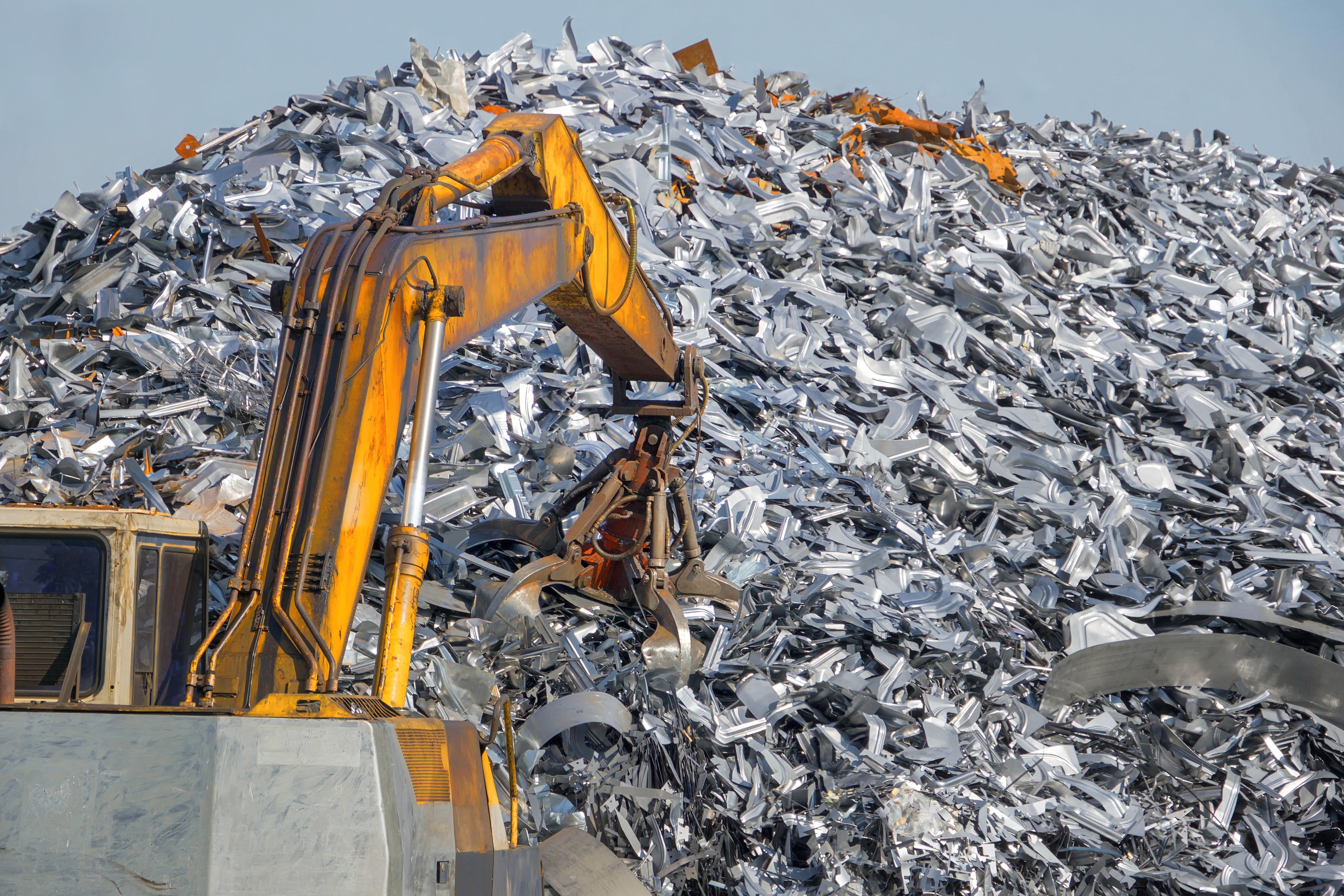

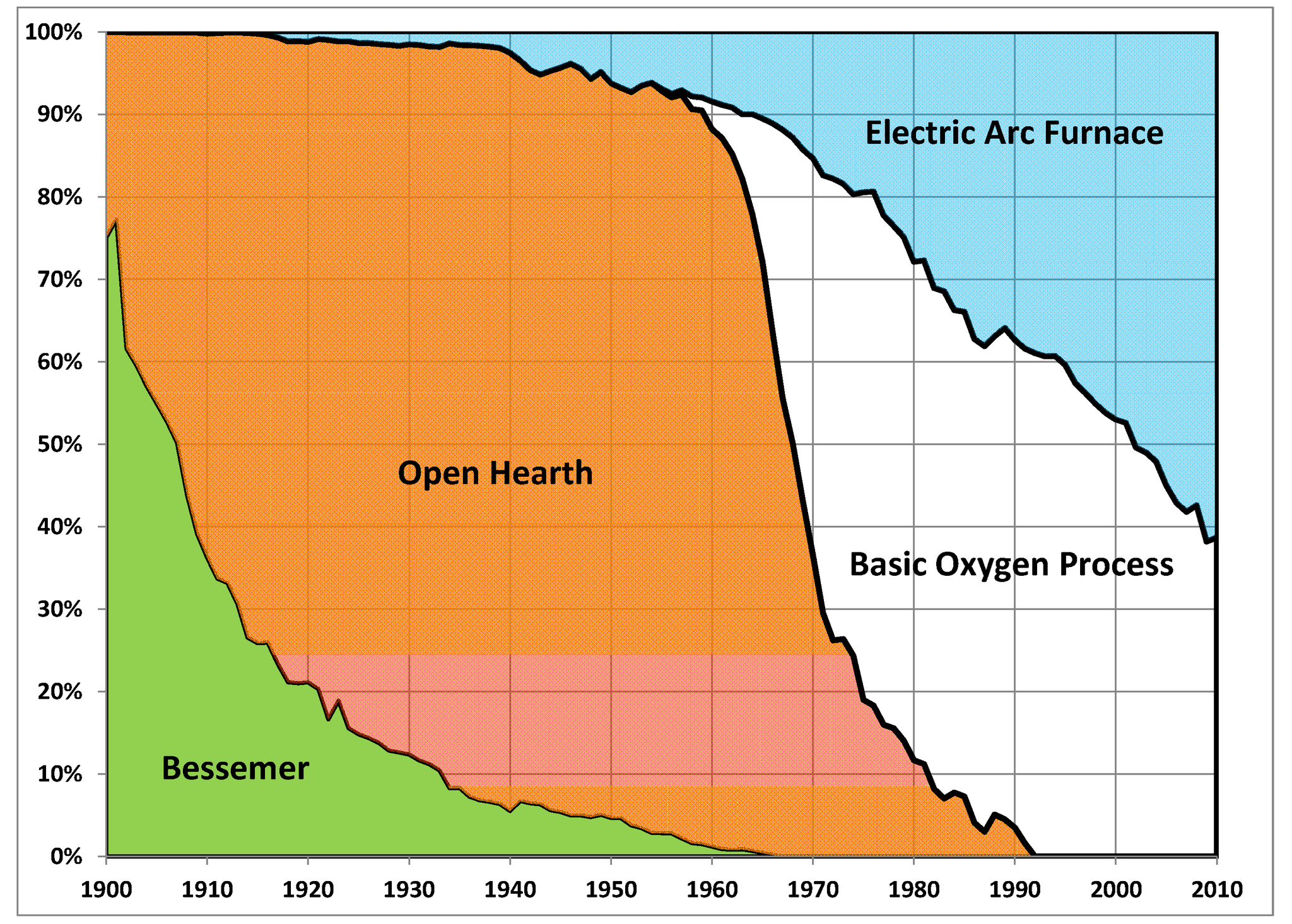
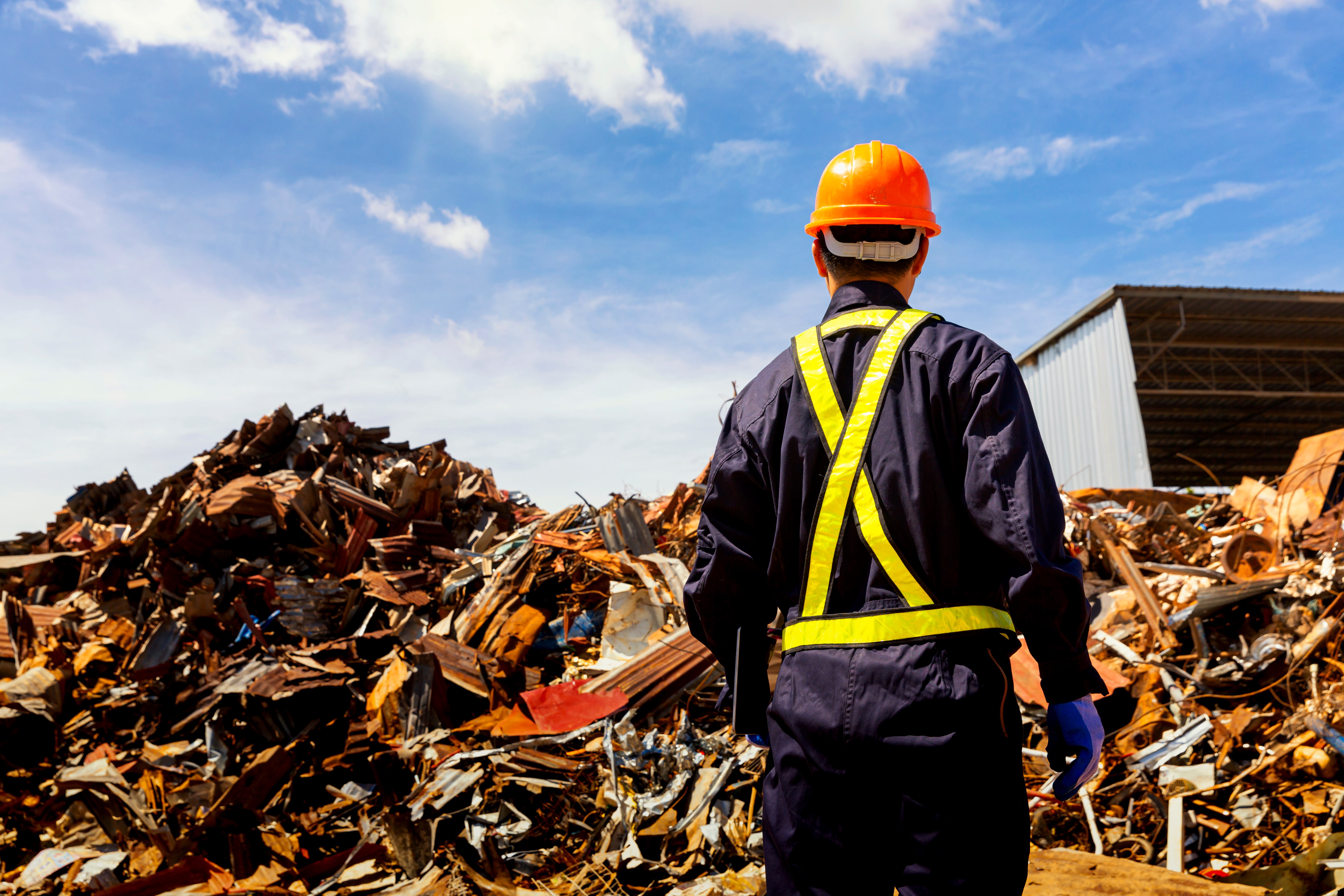
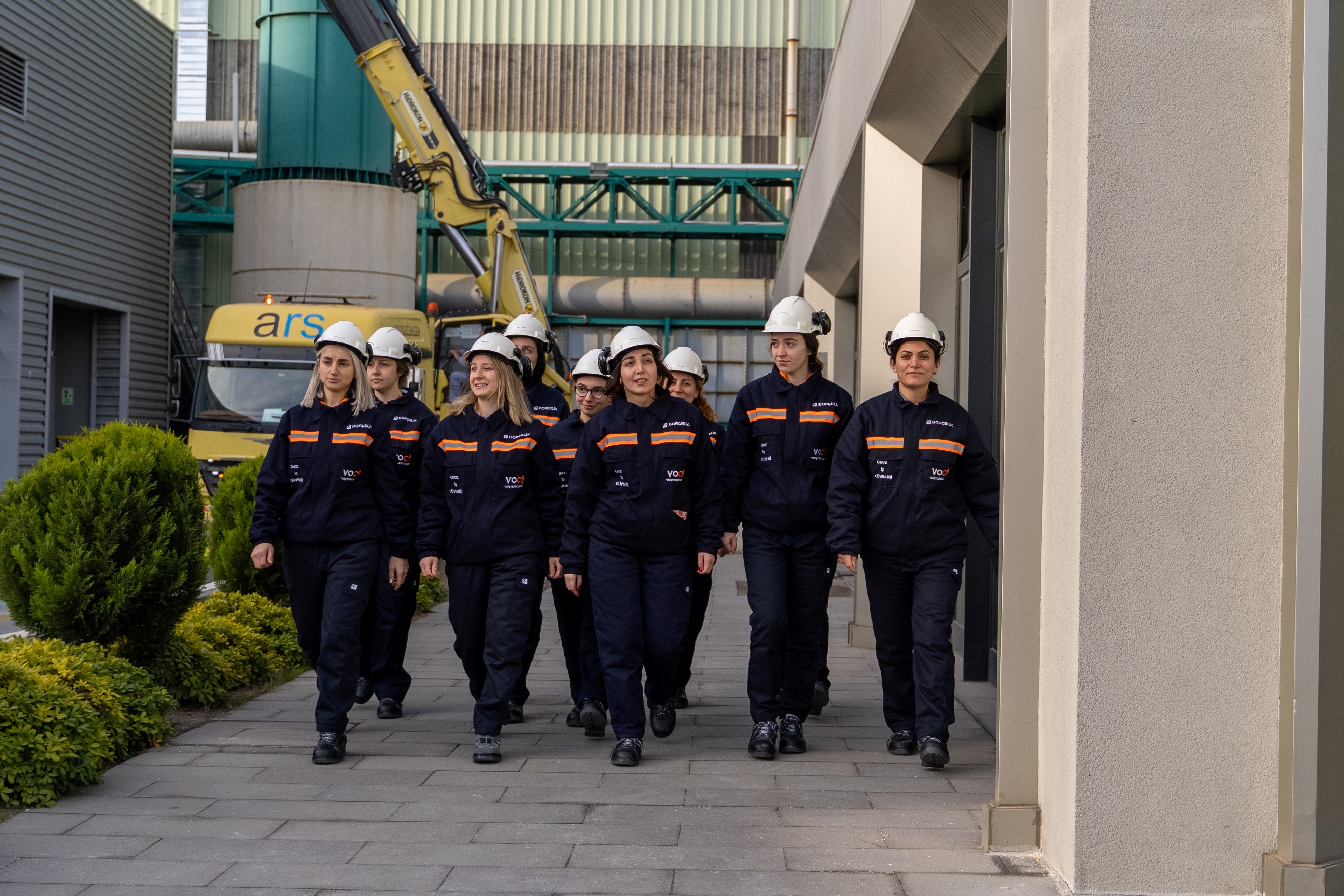
.png)





